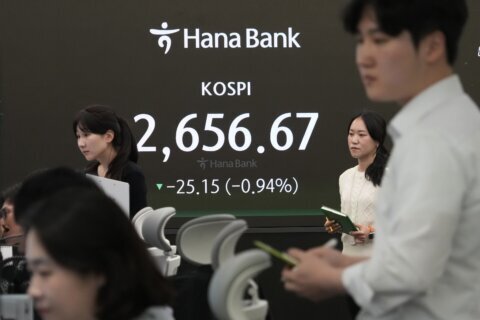BEIJING (AP) — More than 380 people have tested positive in a growing COVID-19 outbreak south of Beijing in China’s Hebei province.
Hebei health authorities said that 40 new cases had been confirmed Sunday morning, bringing the total to 223. Another 161 people tested positive but showed no symptoms. China does not include such asymptomatic cases in its official tally.
The outbreak has raised particular concern because Hebei borders the nation’s capital. Travel between the two has been restricted, with workers from Hebei having to show proof of employment in Beijing to enter the city.
Almost all the cases are in Shijuazhuang, the provincial capital, which is about 260 kilometers (160 miles) southwest of Beijing. A handful have also been found in Xingtai city, 110 kilometers (68 miles) farther south.
Both cities have conducted mass testing of millions of residents, suspended public transportation and taxis, and restricted residents to their communities or villages for one week.
Earlier Sunday, China’s National Health Commission reported that 69 new cases had been confirmed nationwide the previous day, most of them in Hebei. The others included 21 people who had arrived recently from overseas.
Beijing had one new case, bringing the number of confirmed cases to 32 in a smaller outbreak that surfaced about three weeks ago. Almost all the cases have been in Shunyi in the city’s northeastern suburbs.
In other developments in the Asia-Pacific region:
— Japanese opposition lawmakers slammed the government’s emergency declaration as too late to stem the surging coronavirus cases. They also pushed for more testing, which have lagged in Japan, being expensive and hard to get unless people who take them are severely ill. “It’s essential to consider the worst possible scenario, but the response has always been based on an overly optimistic outlook,” Yukio Edano, a former economy minister, said on public broadcaster NHK TV. Opposition lawmakers Toranosuke Katayama and Kazuo Shii also criticized the state of emergency as too limited in scope, area and duration. The declaration, which kicked in Friday, centers around asking restaurants to close at 8 p.m. It lasts a month and focuses on the Tokyo area. Prime Minister Yoshihide Suga defended the measure and stressed that the rising curve will get flattened in a month. Deaths related to COVID-19 have totaled about 4,000 nationwide. Worries are growing about hospitals getting stretched thin. Tokyo’s cases have surged recently to more than 2,000 a day. Other urban areas have also asked the central government for similar emergency measures.
___
Follow AP’s coverage at https://apnews.com/hub/coronavirus-pandemic, https://apnews.com/hub/coronavirus-vaccine and https://apnews.com/UnderstandingtheOutbreak
Copyright © 2024 The Associated Press. All rights reserved. This material may not be published, broadcast, written or redistributed.






